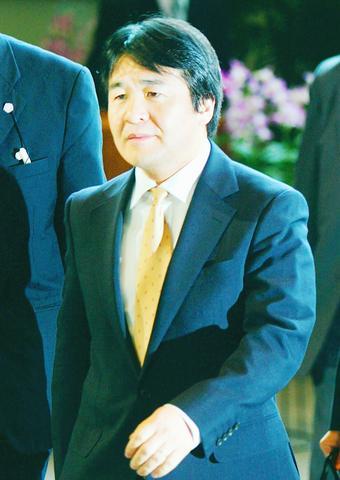Heizo Takenaka was reappointed to his positions in charge of banking and economic policy by Prime Minister Junichiro Koizumi and said he'll push ahead with efforts to clean up US$384 billion of bad loans at Japanese lenders.
"Bad loans have started to fall significantly," Takenaka told reporters in Tokyo after being reappointed financial services minister and minister for economic and fiscal policy.

PHOTO: REUTERS
"It's necessary to continue pushing ahead with restructuring," he said.
Koizumi reshuffled his Cabinet yesterday in preparation for a general election after keeping his post as head of the ruling Liberal Democratic Party (LDP) last Saturday. He named Sadakazu Tanigaki, a 58-year lawyer, to replace Masajuro Shiokawa as finance minister.
The appointments signal that Koizumi will take on opponents within his ruling party and fulfill two-and-a half-year old pledges to curb spending, clean up bad loans choking Japan's banks and take other steps to restart the world's second-largest economy after three recessions in 12 years, investors said.
"Keeping Takenaka suggests that Koizumi is set on pursuing the structural reforms that he's made central to his policy," said Taiji Yoshida, who helps manage the equivalent of US$23.8 billion in assets at Yasuda Capital Management Co in Tokyo.
"Now the onus is on Koizumi to actually carry out some of the policies that he has been advocating," he said.
"Markets were afraid that reforms in the banking sector would be watered down if a conservative politician took over the banking regulator's job," said Nozomu Kunishige, a bank analyst at BNP Paribas Securities Japan.
Japan's economy expanded at an annual rate of 3.9 percent in the second quarter, the fastest pace since Koizumi took office in April 2001, as Toyota Motor Corp, Sharp Corp and other exporters increased capital investment to meet growing demand for Japanese cars and flat-screen televisions in the US and other markets.
Tanigaki, currently in charge of the Industrial Revitalization Corp of Japan, must pursue two potentially contradictory goals, analysts said: curbing the developed world's largest public debt while also protecting a recovery from the nation's third recession in 12 years.
"Koizumi has already mapped out the country's fiscal and economic policy and promised to keep spending tight, so there is little room left for a new finance minister to maneuver," said Akio Yoshino, who helps manage the equivalent of US$14 billion in assets at SG Yamaichi Asset Management Co.
Tanigaki will also direct Japan's currency policy. Japan sold a record ?9.03 trillion (US$80.5 billion) between January and July to stem the yen's strength and protect profits of exporters such as Toyota and Sharp, whose sales have driven the economic recovery.
Shiokawa cut spending on roads, bridges and other public works by 10 percent in the fiscal year that ended on March 31. The cuts angered LDP leaders who have long favored public works spending to stimulate the economy.

The CIA has a message for Chinese government officials worried about their place in Chinese President Xi Jinping’s (習近平) government: Come work with us. The agency released two Mandarin-language videos on social media on Thursday inviting disgruntled officials to contact the CIA. The recruitment videos posted on YouTube and X racked up more than 5 million views combined in their first day. The outreach comes as CIA Director John Ratcliffe has vowed to boost the agency’s use of intelligence from human sources and its focus on China, which has recently targeted US officials with its own espionage operations. The videos are “aimed at

STEADFAST FRIEND: The bills encourage increased Taiwan-US engagement and address China’s distortion of UN Resolution 2758 to isolate Taiwan internationally The Presidential Office yesterday thanked the US House of Representatives for unanimously passing two Taiwan-related bills highlighting its solid support for Taiwan’s democracy and global participation, and for deepening bilateral relations. One of the bills, the Taiwan Assurance Implementation Act, requires the US Department of State to periodically review its guidelines for engagement with Taiwan, and report to the US Congress on the guidelines and plans to lift self-imposed limitations on US-Taiwan engagement. The other bill is the Taiwan International Solidarity Act, which clarifies that UN Resolution 2758 does not address the issue of the representation of Taiwan or its people in

US Indo-Pacific Commander Admiral Samuel Paparo on Friday expressed concern over the rate at which China is diversifying its military exercises, the Financial Times (FT) reported on Saturday. “The rates of change on the depth and breadth of their exercises is the one non-linear effect that I’ve seen in the last year that wakes me up at night or keeps me up at night,” Paparo was quoted by FT as saying while attending the annual Sedona Forum at the McCain Institute in Arizona. Paparo also expressed concern over the speed with which China was expanding its military. While the US

SHIFT: Taiwan’s better-than-expected first-quarter GDP and signs of weakness in the US have driven global capital back to emerging markets, the central bank head said The central bank yesterday blamed market speculation for the steep rise in the local currency, and urged exporters and financial institutions to stay calm and stop panic sell-offs to avoid hurting their own profitability. The nation’s top monetary policymaker said that it would step in, if necessary, to maintain order and stability in the foreign exchange market. The remarks came as the NT dollar yesterday closed up NT$0.919 to NT$30.145 against the US dollar in Taipei trading, after rising as high as NT$29.59 in intraday trading. The local currency has surged 5.85 percent against the greenback over the past two sessions, central